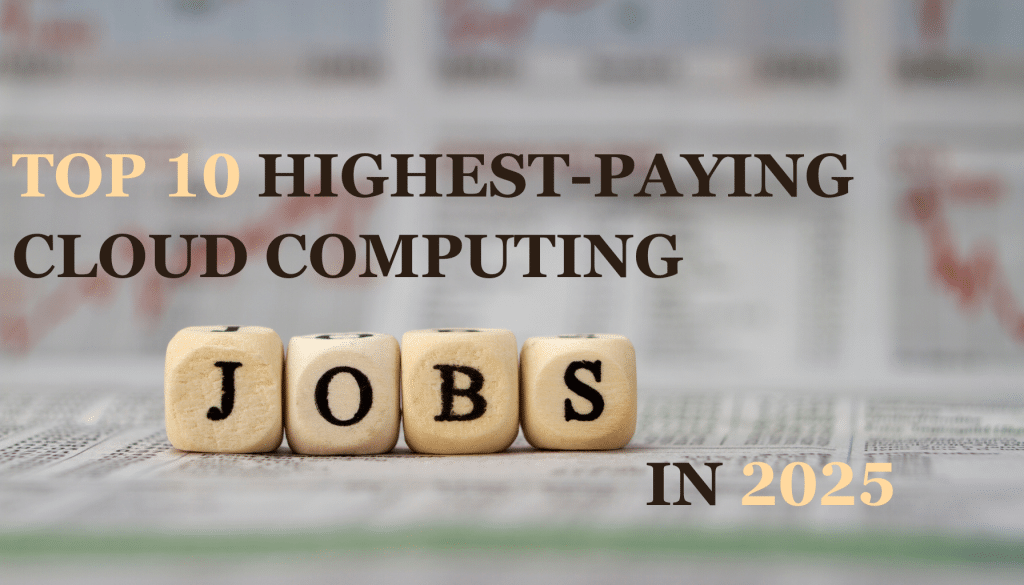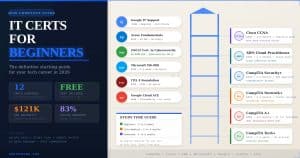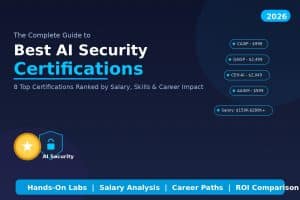There’s a buzz around cloud computing, and it’s not hard to see why. Businesses, whether startups or giants, are shifting operations online faster than ever. This has created a massive demand for cloud experts who know how to keep systems running smoothly, securely, and cost-effectively.
And let’s be real, when demand goes up, salaries follow. If you’re wondering which certifications can help you land these roles, here’s a roundup of the Best Cloud Certifications in 2026 that align with top-paying jobs.
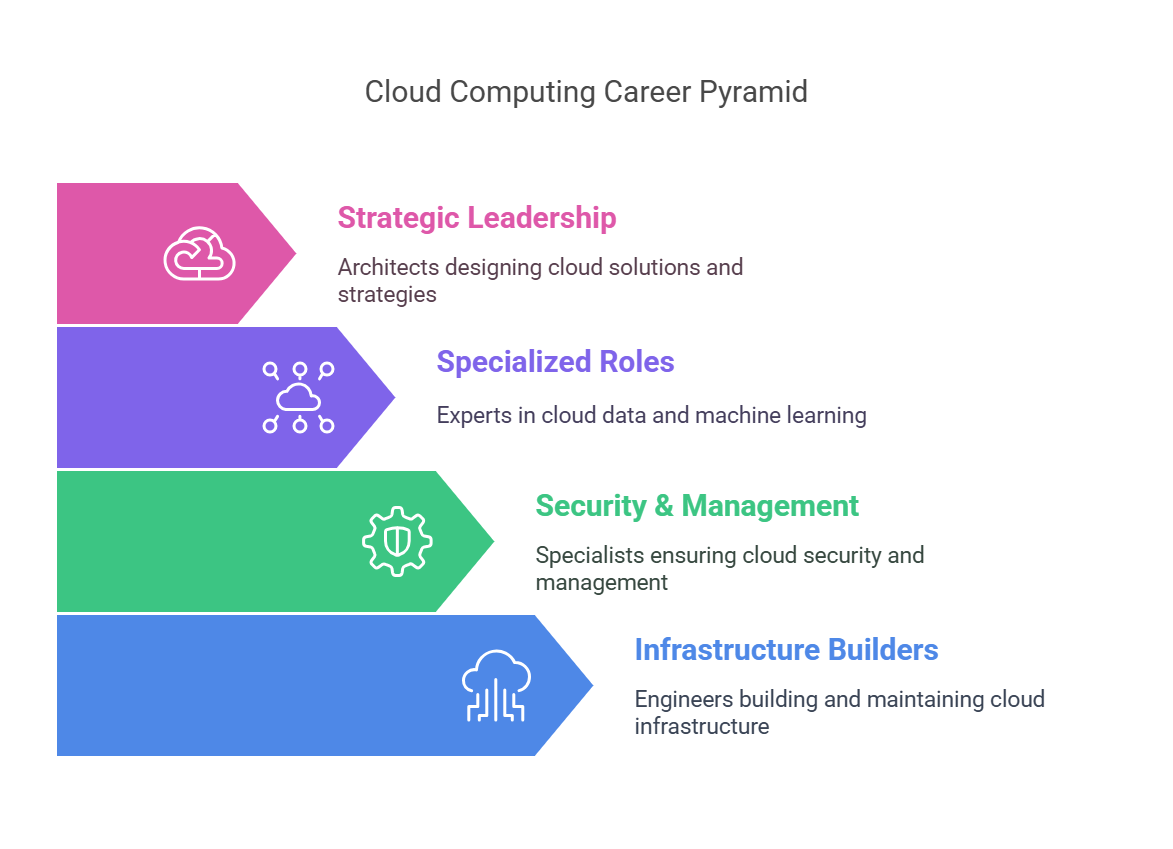
Top 10 Cloud Jobs That Promise the Biggest Paychecks in 2026
Some jobs in the cloud computing industry don’t just pay well; they’re game-changers for your career. But what makes these roles stand out from the rest? It’s a mix of technical know-how, problem-solving ability, and, let’s be honest, a touch of innovation. The skills you bring to the table can make or break your earning potential top cloud computing careers. For example:
- Coding Languages: Python, Java, and Go are must-haves for many cloud roles.
- Certifications (aka Certs): AWS Solutions Architect, Azure Administrator, and Google Cloud Professional Engineer certs can open doors, and bigger paychecks.
- Security Knowledge: As hacks and breaches become more common, cloud security engineers are raking in higher salaries.
Bottom line? The more versatile and up-to-date your skills, the more you can negotiate your paycheck.
1. Cloud Architect: The Strategic Innovator
A cloud architect’s job isn’t just about building cloud systems. It’s about designing entire infrastructures that businesses rely on for everything. From data storage to software management, they create the foundation that holds everything together.
The role requires a deep understanding of various cloud services like AWS, Azure, and Google Cloud, and how they interact. This requires solid knowledge of networking, security, and sometimes even a bit of coding. It’s also about cost management, ensuring businesses get the most bang for their buck in the cloud.
Skills and Certs:
To step into this role, you are gonna need some top-notch certs, like AWS Certified Solutions Architect, Google Professional Cloud Architect, and Azure Solutions Architect. These are your golden tickets for higher-paying opportunities.
Couple these with experience in system design, IT infrastructure, and various cloud architecture and deployment strategies, and you’re looking at a hefty paycheck.
Salary Range:
In 2026, you can expect to see salaries ranging from $140K to $200K annually. The pay jumps higher when working in specialized areas like hybrid cloud solutions or AI cloud platforms.
Big companies and startups will pay handsomely for cloud architects who can stay ahead of the curve. If you’re just starting out, it might be smarter to build a base with one of the Easiest Cloud Certifications for Beginners before jumping into advanced paths like architecture.
2. DevOps Engineer: Bridging Development and Operations
DevOps engineers have been riding high in tech salary charts for a while now. Why?
Because they’re the glue that holds development and operations together. While devs focus on writing code and sysadmins manage servers, DevOps engineers ensure that everything runs seamlessly between them.
They’re all about automating processes and optimizing how software gets built, tested, and deployed.
With the growing demand for fast, reliable software delivery, companies can’t afford to have slow or buggy deployments. DevOps professionals use tools like Jenkins, Docker, Kubernetes, and CI/CD pipelines to streamline processes and ensure quick, seamless rollouts.
Skills and Tools:
Knowing your way around cloud platforms like AWS, Azure, or Google Cloud is essential, but you also need to be proficient in automation tools, scripting languages, and containerization.
Having experience with tools like Terraform, Ansible, and Kubernetes will seriously boost your salary potential.
Salary Range:
For 2026, DevOps Engineers can expect anywhere from $130K to $190K a year, depending on their skillset and the specific cloud platforms they work with. The more experience you have automating cloud environments and integrating new tools, the more money you’ll pull in.
3. Cloud Security Engineer: The Protector of Data
Cloud security is a huge deal. The amount of sensitive data stored in the cloud has exploded, and with it, the need for security experts.
Cloud security engineers are responsible for keeping data safe from hackers, ensuring compliance with laws like GDPR and HIPAA, and preventing breaches that could cost companies millions.
With cyberattacks becoming more sophisticated, businesses are paying top dollar for security professionals who can implement encryption, firewalls, and intrusion detection systems in cloud environments. They need to stay one step ahead of cybercriminals, constantly tweaking and improving defenses.
Skills in penetration testing, risk management, and cloud access security are essential. A deep understanding of identity management (IAM) in the cloud is also crucial.
Salary Range:
In 2026, cloud security engineers can expect to see salaries starting from $130K and going up to $210K, especially if you’re managing large-scale, high-stakes projects.
Companies want to protect their data, and they’re willing to pay big bucks for the right people to make that happen.
4. Cloud Data Engineer: Turning Data into Gold
Data is king. But without the right infrastructure to handle it, data is just… well, noise. Cloud data engineers design and maintain systems that help companies store, manage, and process massive amounts of data. They create pipelines that allow data scientists to analyze, visualize, and make decisions from it.
It’s a high-pressure role because data is a business’s most valuable asset, and it’s all sitting in the cloud.
Cloud data engineers use technologies like Hadoop, Spark, and SQL-based data warehouse systems to create scalable data architectures. They need to understand both cloud infrastructure and data science, and how to optimize storage and processing for fast, real-time insights.
Skills and Tools:
Expertise in cloud platforms like AWS Redshift, Google BigQuery, or Azure Synapse is a must. You’ll also need solid SQL skills and familiarity with data modeling, ETL processes, and tools like Apache Kafka.
Salary Range:
By 2026, top cloud data scientists and engineers are expected to earn between $125K and $185K per year. Experience with big data technologies, real-time data processing, and cloud data systems will give you a serious edge.
5. Solutions Architect: Tailoring Cloud Solutions for Businesses
Solutions architects are the middlemen who speak the language of both business and tech. They meet with clients, understand their business goals, and design the perfect cloud solutions to meet those needs.
Whether it’s creating a hybrid cloud environment or helping a company migrate to the cloud, solutions architects have a wide-ranging role that covers both the technical and strategic aspects.
They need to know how to design cost-effective, scalable, and secure cloud operating systems, that align with business objectives. They work closely with developers, security teams, and IT staff to ensure the project is successful from both a technical and business perspective.
Certs and Skills:
For this role, AWS Certified Solutions Architect, Google Cloud Professional Cloud Architect, and Azure Architect certifications are key. You also need strong communication skills and an understanding of business processes.
Salary Range:
Solutions architects typically make between $130K and $210K annually. The average salary goes up as the projects they work on get bigger and more complex.
6. Cloud Product Manager: Where Business Meets Technology
Cloud product managers work at the intersection of business, technology, and user experience. They’re responsible for managing the lifecycle of cloud products and services, from ideation to execution.
This is a role for someone who understands not just cloud technology but also the market and customer needs.
You will be balancing tech specifications with business goals and ensuring that products stay on track and on budget.
Skills and Tools:
Knowledge of cloud platforms and their capabilities is a must. You’ll also need strong project management skills, the ability to coordinate teams, and a good understanding of customer needs.
Certs like AWS Certified Cloud Practitioner can help, but product management experience matters most.
Salary Range:
In 2026, cloud product managers can earn between $120K and $180K, depending on their experience, the company, and how complex the product is.
7. Machine Learning Engineer in Cloud: AI Meets Cloud Computing
As AI and machine learning continue to grow, the need for machine learning engineers who understand cloud infrastructure has skyrocketed. These professionals work on building, deploying, and optimizing AI/ML models in cloud environments.
Skills and Tools:
Proficiency in Python, TensorFlow, and PyTorch is a must. Familiarity with cloud platforms like AWS SageMaker, Google AI Platform, or Azure Machine Learning is also crucial.
Salary Range:
Machine learning engineers in the next cloud computing career can make anywhere from $140K to $220K annually in 2026. The field of cloud computing professionals is competitive, and as the tech grows, so do the salaries.
8. Cloud Infrastructure Engineer: The Backbone of Cloud Systems
Cloud infrastructure engineers are the behind-the-scenes warriors who ensure that everything in the cloud works smoothly. They focus on maintaining and optimizing the hardware and software that make cloud services run.
These engineers work on everything from network connectivity to virtual machines, storage solutions, and load balancing.
Unlike cloud architects who design systems, cloud infrastructure engineers are the ones who ensure these designs actually function and perform as intended.
They spend their days monitoring systems, troubleshooting issues, and allocating resources efficiently to avoid performance bottlenecks.
Skills and Tools:
Cloud infrastructure engineers must be familiar with AWS, Google Cloud, or Azure services. Expertise in cloud-native networking and systems management tools is a plus. Terraform, Docker, and Kubernetes proficiency will also help you stand out.
Salary Range:
For 2026, the average salary for cloud infrastructure engineers typically ranges from $120K to $180K. If you have experience with cloud orchestration and automation tools, that salary could jump even higher.
9. Cloud Consultant: Guiding Businesses into the Cloud Era
Cloud consultants are the advisors companies turn to when they need help navigating the transition to the cloud. Their job is to understand a company’s needs and design a roadmap that helps them migrate to cloud systems efficiently and securely.
Cloud consultants need a good mix of technical knowledge and business acumen, as they must ensure the various cloud based services and solutions that they recommend are both technically sound and align with the client’s goals.
The role can be broad, with consultants working on cloud migrations, optimising, security, or implementing cloud-based software solutions. They often act as the bridge between clients and technical teams, making sure the cloud solutions implemented are on target and cost-effective.
Consultants also need solid project management and excellent communication skills to effectively work with clients.
Salary Range:
Cloud consultants in 2026 can expect to earn between $120K and $200K annually. Experienced consultants working with large enterprises or specialized cloud solutions may command even higher rates.
10. Site Reliability Engineer (SRE): Ensuring Cloud Uptime
Site Reliability Engineers (SREs) focus on making sure that cloud systems stay online and operate smoothly at all times. The role combines software engineering and systems engineering to create highly reliable and scalable cloud environments.
They write code to automate system management tasks, optimize performance, and implement measures that ensure minimal downtime.
As businesses move more critical operations to the cloud, the need for SREs has risen dramatically.
These professionals are key in maintaining the reliability and efficiency of cloud systems, ensuring that applications and services are always available for users.
Skills and Tools:
Proficiency in programming languages like Python, Go, or Java is essential. SREs must also be well-versed in cloud services (AWS, GCP, or Azure) and monitoring tools like Prometheus, Grafana, or Datadog.
Familiarity with continuous integration/deployment pipelines is also a must.
Salary Range:
Site reliability engineers are looking at salaries between $130K and $210K in 2026. Companies are willing to pay top dollar for SREs who can keep their cloud systems running without a hitch and ensure a smooth user experience.
Essential Certifications: AWS, Google Cloud, Azure, and More
Certifications are one of the fastest ways to validate your skills and boost your credibility.
While many cloud professionals are self-taught, the right certifications can make a huge difference, especially when employers seek candidates with proven expertise.
Earning a cloud certification validates your expertise and sets you apart in a competitive market. Not sure which ones push the limits? Here’s a breakdown of the Hardest Cloud Certifications and why they matter for ambitious professionals.
Many professionals trust Cert Empire for high-quality exam dumps that mirror real test questions, helping them pass on the first attempt.
Microsoft Certified: Azure Fundamentals – AZ-900
New to cloud computing? The Azure Fundamentals (AZ-900) certification is the perfect starting point. It introduces you to Azure’s core concepts, pricing, compliance, and security, without diving too deep into the technical side.
With companies shifting to the cloud, understanding how Azure works is a valuable skill, even if you’re not in an IT role. This cert is great for business professionals, sales teams, and beginners looking to grasp the fundamentals of cloud computing.
If you’re planning a cloud career, AZ-900 is a stepping stone to more advanced Azure certifications like Azure Administrator (AZ-104) and Azure Security Engineer (AZ-500). So, If you’re considering the AZ-900 exam, check out this detailed Guide on AZ-900 Certification for exam structure, study tips, and career benefits.
Microsoft Certified: Azure Administrator Associate – AZ-104
If you want to manage, monitor, and optimize Azure environments, the Azure Administrator Associate (AZ-104) certification is a must. It covers virtual machines, networking, storage, and identity management, making it essential for IT professionals handling Azure infrastructure.
Businesses in finance, healthcare, and tech need skilled Azure admins to keep their cloud environments secure and efficient. With Azure’s strong hybrid capabilities, this cert is great for those balancing on-premises and cloud systems.
Looking to advance your career? AZ-104 is a foundation for higher-level Azure certifications like Azure Solutions Architect (AZ-305) and Azure DevOps Engineer (AZ-400). So, if you want to understand the full scope of AZ-104 and its impact on your career? Dive into Understanding the AZ-104 Certification: Key Stats and Exam Insights to get a clear picture of exam details, job prospects, and preparation strategies.
Microsoft Certified: Azure Security Engineer Associate – AZ-500
Cybersecurity is a top priority for businesses, and the Azure Security Engineer Associate (AZ-500) certification proves you know how to protect Azure environments from threats. This cert focuses on identity and access management, threat protection, encryption, and security policies within Microsoft’s cloud ecosystem.
With industries like banking, government, and healthcare relying on strict security measures, Azure security engineers are in high demand. If you’re interested in cloud security, compliance, or risk management, AZ-500 is a solid career move.
If you’re aiming to specialize in cloud security, make sure to read the AZ-500 Certification Complete Guide for a breakdown of the exam and career opportunities. This cert pairs well with Azure Administrator (AZ-104) and can lead to more specialized security roles in cloud environments.
AWS Certified Cloud Practitioner – CLF-C02
The AWS Cloud Practitioner (CLF-C02) certification is an excellent way to understand the basics of Amazon Web Services (AWS), the world’s most popular cloud platform. It covers AWS services, billing, security, and cloud concepts, making it ideal for non-technical professionals, beginners, and business leaders.
With 90% of Fortune 500 companies using AWS, this cert is valuable across industries. It’s a great starting point before diving into more technical AWS certifications like AWS Solutions Architect (SAA-C03) or AWS Security Specialty.
Thinking about taking the AWS Cloud Practitioner exam? Learn everything you need to know in All You Need to Know About AWS Cloud Practitioner CLF-C02 Cert, including key topics, study tips, and real-world applications.
If you’re working with multi-cloud environments, pairing this cert with Azure Fundamentals (AZ-900) can give you a well-rounded cloud foundation.
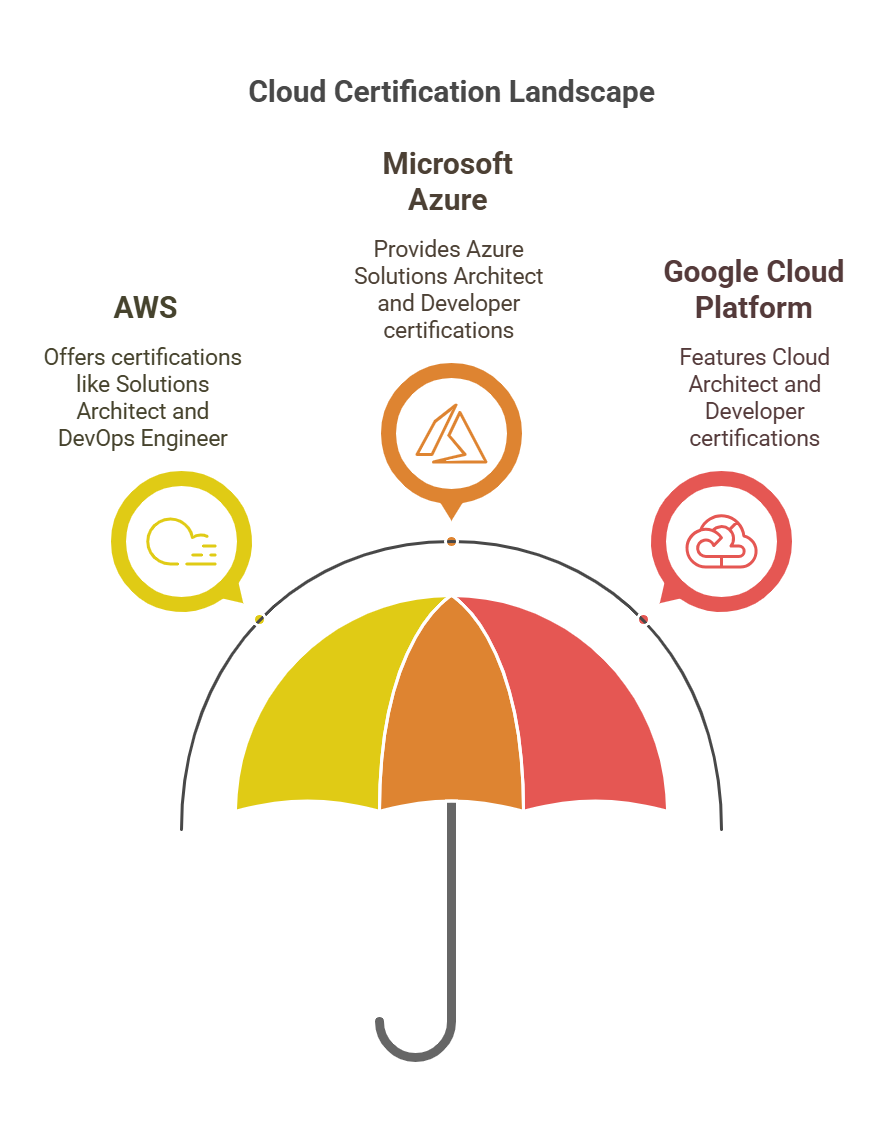
Programming Languages and Tools in Demand for Cloud Professionals
Cloud computing isn’t just about knowing how to use a platform; it’s about using it effectively to build, scale, and manage cloud-based applications. A strong command over programming languages and tools is essential for most high-paying cloud roles.
Some key computer programming languages you’ll want to master include:
- Python: It’s one of the most versatile and widely used languages in cloud environments, especially for automating cloud deployments, managing infrastructure, and scripting.
- JavaScript/Node.js: If you are focusing on front-end or full-stack cloud applications, JavaScript is crucial. It’s also key for serverless computing on cloud platforms like AWS Lambda.
- Go: Google’s language, Go (or Golang), is gaining popularity, especially for building microservices and managing large-scale cloud systems.
- Java: Though not as trendy as Python or Go, Java is still widely used, especially in enterprise-level cloud solutions and for backend services.
In terms of tools, a few standouts include:
- Terraform: This Infrastructure as Code (IaC) tool helps automate the provisioning and management of cloud resources, making it an essential tool for cloud infrastructure engineers.
- Docker and Kubernetes: Containers are the backbone of modern cloud development. Mastering Docker for containerization and Kubernetes for orchestration is almost non-negotiable if you want to work in cloud engineering or DevOps.
- Ansible and Chef: These tools help automate cloud configuration management, ensuring systems are consistent and scalable.
- CI/CD Tools like Jenkins, CircleCI, and GitLab are essential for automating testing, integration, and deployment of applications in cloud environments.
Gaining Hands-on Experience: Where and How to Start?
While certifications and knowledge are important, hands-on experience is where the rubber meets the road. Employers want to know that you can take what you’ve learned and apply it in real-world scenarios.
1. Create Your Own Cloud Projects
Start small by building applications and experimenting with cloud services like AWS, Azure, or GCP. Try serverless functions or set up cloud databases to apply your knowledge practically.
2. Take Advantage of Free Tiers and Trials
Use free tiers or low-cost trials from cloud platforms to explore various tools and services without the cost. This allows you to deploy code and set up infrastructure.
3. Leverage Infrastructure as Code (IaC)
Practice using IaC tools like Terraform or CloudFormation to automate cloud infrastructure deployment, enhancing efficiency and consistency.
4. Contribute to Open-Source Projects
Join cloud-related open-source projects on GitHub to collaborate with experienced professionals and solve real-world challenges while building your portfolio.
5. Enroll in Hands-on Labs
Use platforms like Cloud Academy, A Cloud Guru, or Pluralsight to access labs that simulate real-world cloud environments, allowing you to build practical skills.
Is a Career in the Cloud Right for You?
It’s easy to get excited about cloud careers, especially with all the perks and high salaries. But is this the right path for you? Cloud jobs aren’t for everyone. The roles require specific skills in depth knowledge, and a mindset that’s geared toward problem-solving, innovation, and adaptability.
Conclusion!
A cloud career offers much more than just a paycheck. The perks, remote work, flexibility, stock options, and bonuses, make it an attractive option for many professionals.
However, a career in the cloud also requires the right personality traits and skills, along with a willingness to face the challenges that come with it. If you are the type of person who thrives on problem-solving, continuous learning, and working in dynamic environments, a cloud career could be a perfect fit.
With the right mindset, the rewards go far beyond financial compensation. To stay competitive, make sure you’re keeping up with the Future Trends in Cloud Computing shaping these career opportunities.
FAQs
What is the highest-paying cloud computing job in 2026?
Cloud Architects are expected to be the highest-paid in 2026, with salaries ranging from $150,000 to $250,000, as they design and manage complex cloud infrastructures for organizations.
Which certifications are most valuable for cloud professionals?
Valuable cloud certifications include AWS Certified Solutions Architect, Microsoft Azure Solutions Architect, Google Professional Cloud Architect, Certified Kubernetes Administrator (CKA), and Certified Cloud Security Professional (CCSP), all of which enhance career opportunities and salary potential.
Can I get a cloud computing job without prior experience?
Yes, you can land a cloud job without prior experience by obtaining relevant certifications, gaining hands-on experience through projects or internships, and starting in entry-level roles like Cloud Support Associate.
How do cloud computing salaries vary across industries?
Salaries for cloud computing jobs are highest in tech, finance, and healthcare industries, with roles like Cloud Architect and Cloud Security Engineer commanding top pay, while industries like retail and education tend to offer more moderate salaries.
What are the fastest-growing roles in the cloud sector?
The fastest-growing cloud roles include Cloud Security Engineers, DevOps Engineers, Cloud Data Engineers, Machine Learning Engineers, and Site Reliability Engineers, driven by the increasing demand for cloud services and data-driven technologies.

